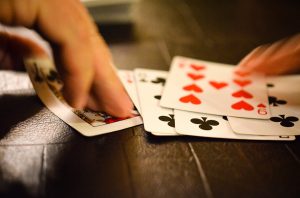 If you unexpectedly tell a stranger in the middle of a conversation that you are a professional poker player, you will likely experience a familiar reaction. They will often start talking about friends' sisters' exes who play poker or that they once went to Vegas, they might start asking if you've participated in a big tournament, what your parents think about your career, start guessing that you must be good at math, and so on. But one of the most annoying statements: “Oh, so you must have a really good poker face.”
If you unexpectedly tell a stranger in the middle of a conversation that you are a professional poker player, you will likely experience a familiar reaction. They will often start talking about friends' sisters' exes who play poker or that they once went to Vegas, they might start asking if you've participated in a big tournament, what your parents think about your career, start guessing that you must be good at math, and so on. But one of the most annoying statements: “Oh, so you must have a really good poker face.”
The image of a “poker face” has become so widely recognized in our culture that it is practically synonymous with the game itself. If you know what poker is, you know what a poker face is. But this expression symbolizes not only the role played in poker. What we call a poker face would be familiar to Roman Stoics, Zen samurais, warriors, mystics, gamblers, and thieves throughout human history.
A poker face is an unparalleled symbol of humanity. It is a mask of emotionlessness “worn” on the face, hiding the personality beneath it. A poker face floats somewhere above the game, detached from fear, anger, or despair, even though it seems that everyone else feels it. This is part of the explanation why the profession of a “poker player” seems so alluringly charming, almost inhuman to many.
So, when people ask me: “How can I improve my poker face?”, I feel like I should have an answer. But what can I say? The truth is, there is no way to have a better poker face, or rather no special way. Of course, there are many small tricks that can help in navigating between tilt and excessive joy. Certainly, you can practice in front of a mirror, visualize the action, or similar. And yes, you should close your mouth, relax your muscles, watch your eye movements, stare ahead, breathe consciously, not talk, and everything else. But in reality, everything is just a small part. If you are one of those players who show signs of emotional weakness, these tiny tips won't change you in a short time.
Emotions are like a rock in your mind. Formed by erosion, the forces of the world over the years, the contours of these rocks show the history of your personality. Some players, before they started playing poker, had smoothed the edges of their emotional rocks and have a good poker face, while others still have jagged and sharp edges, and it seems to reveal everything. It's simply the lottery of environment and genes. And there's not much to talk about here.
If you want to have a good poker face, you first have to stop feeling those emotions. As soon as you start playing poker, the best way to soften your emotions is by using the strength of character. Rumors, the passage of time, thousands of poker hands against you will burden your mind. So, be conscious, observe yourself, learn to form new beliefs, adapt to the environment, try many other various techniques to improve and control the expression of your emotions. But ultimately, what you can do is wait. Play, feel, and suffer. If you stay in it long enough, eventually your features will be polished. It takes time, so be patient. How can you become more patient? It is the only good trait that depends entirely on you. Be calm, let what happens happen. If you are emotionally weak, it's okay, be weak. But keep playing. Don't stop trying, don't give up when you make a mistake. We all were once where you are now. If you come back tomorrow, and then the next day, one day, everything will change.





